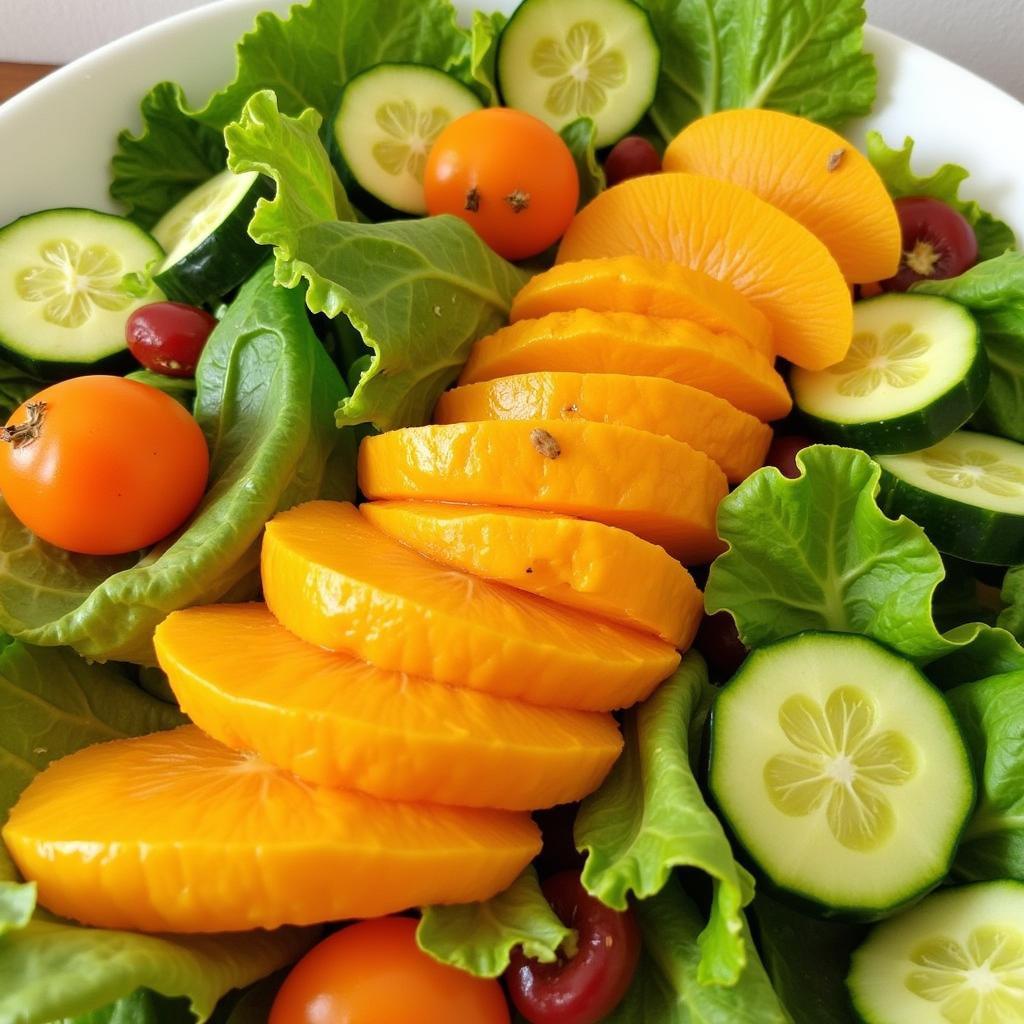Exploring the African Cucumber Fruit: A Unique Culinary Delight
The African Cucumber Fruit, also known as kiwano melon or horned melon, is a fascinating and nutritious fruit native to Africa. Its vibrant orange skin and spiky exterior make it a truly unique addition to any meal. But there’s more to this exotic fruit than just its striking appearance. Let’s delve into the world of the African cucumber fruit and discover its rich history, culinary uses, and health benefits.
Learn about the amazing african horned cucumber seeds and how to cultivate this unique fruit.
What is the African Cucumber Fruit?
The African cucumber fruit, despite its name, isn’t actually a cucumber. It belongs to the Cucurbitaceae family, which includes melons, cucumbers, and squash. Its scientific name is Cucumis metuliferus. Originating in Sub-Saharan Africa, it’s now cultivated in various parts of the world, including California, Chile, Australia, and New Zealand. Its taste is often described as a blend of banana, cucumber, and lime, offering a refreshing and tangy flavor profile.
Culinary Uses of the African Cucumber Fruit
This versatile fruit can be incorporated into a wide variety of dishes, both sweet and savory. Its pulpy interior can be eaten raw, scooped directly from the fruit, or added to salads for a refreshing twist. The seeds are also edible and have a slightly nutty flavor.
Want to learn more about the nutritional value? Check out this insightful article on african horned cucumber nutrition.
Sweet Applications
- Desserts: The African cucumber’s unique flavor profile complements desserts beautifully. Try adding it to smoothies, sorbets, or even ice cream for a tropical twist.
- Jams and Jellies: Its tangy flavor makes it ideal for creating unique jams and jellies.
- Fruit Salads: Add it to your favorite fruit salad for a pop of color and a refreshing burst of flavor.
Savory Applications
- Salsas and Chutneys: Its tanginess lends itself well to salsas and chutneys, adding a zesty kick to any dish.
- Soups and Stews: The African cucumber can be added to soups and stews to enhance their flavor and texture.
- Grilled or Roasted: Grilling or roasting the fruit brings out its natural sweetness, making it a delicious side dish.
 African Cucumber Fruit in a Salad
African Cucumber Fruit in a Salad
Health Benefits of the African Cucumber Fruit
The African cucumber fruit isn’t just delicious; it’s also packed with nutrients. It’s a good source of vitamins A and C, as well as essential minerals like potassium and magnesium.
Boosting Immunity
The high vitamin C content in the African cucumber can help strengthen the immune system.
Promoting Healthy Skin
Vitamin A plays a crucial role in maintaining healthy skin, and the African cucumber is a good source of this essential vitamin.
Interested in healthy African recipes? Explore an african diet for weight loss.
Growing Your Own African Cucumber
Growing African cucumber can be a rewarding experience. They require warm temperatures and well-drained soil.
Starting from Seed
Start seeds indoors about 6-8 weeks before the last frost.
Planting Outdoors
Transplant seedlings outdoors once the soil has warmed up. Provide adequate sunlight and water.
Discover more on the african cucumber benefits.
Conclusion
The African cucumber fruit, with its unique appearance, refreshing taste, and numerous health benefits, is a true gem. Whether you’re looking to add a new flavor to your dishes or boost your nutrient intake, the African cucumber is definitely worth exploring. Try incorporating this exotic fruit into your diet and experience its unique charm.
A delicious recipe using African cucumber is african coleslaw, a unique and refreshing twist on a classic.
FAQ
- What does African cucumber taste like? It’s described as a mix of banana, cucumber, and lime.
- How do you eat an African cucumber? You can eat it raw, add it to salads, or use it in various dishes.
- Is African cucumber good for you? Yes, it’s a good source of vitamins and minerals.
- Can you grow African cucumber? Yes, it can be grown in warm climates.
- Where can I buy African cucumber? Check your local farmers markets or specialty grocery stores.
- What other names is African cucumber known by? It’s also called kiwano melon and horned melon.
- How do I store African cucumber? Store it at room temperature until ripe, then refrigerate.
Need assistance? Contact us at +255768904061, email kaka.mag@gmail.com, or visit us at Mbarali DC Mawindi, Kangaga, Tanzania. We have a 24/7 customer service team ready to help.



